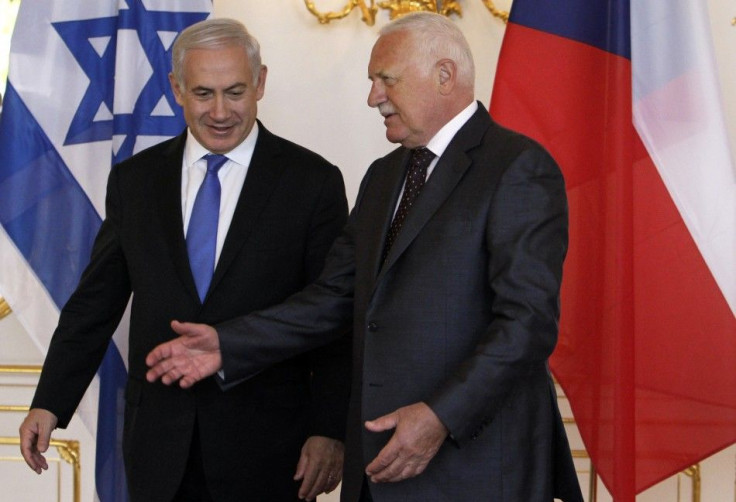Israel?s Netanyahu Sees No Evidence Iran Will Give Up Nuclear Program

Israeli Prime Minister Benjamin Netanyahu has again expressed his skepticism about the impact of economic sanctions and diplomacy in stopping Iran from developing its nuclear power program.
Speaking in Prague, Czech Republic, on Friday, Netanyahu equated Iran’s atomic ambitions to those of North Korea and added that the imminent negotiations between world powers (the five permanent members of the UN Security Council and Germany) and Iran in Baghdad may be fruitless.
Nothing would be better than to just see this issue solved diplomatically, but I have to say I have seen no evidence whatsoever that Iran is serious about stopping its nuclear weapons program, Netanyahu told reporters after a meeting with president Vaclav Klaus.
He also shrugged off some optimistic comments made by diplomats and officials at the International Atomic Energy Agency (IAEA) that talks with Iran are progressing favorably, following discussions between the parties in Vienna, Austria, ahead of the Baghdad parley.
It looks as though they [the Iranians] see these [Baghdad] talks as another opportunity to deceive and delay, just like North Korea did for years. They may try to go from meeting to meeting with empty promises. They may agree to something in principle but not implement it. They may even agree to implement something that does not materially derail their nuclear weapons program.”
The Prime Minister added: Iran is good at playing this chess game. They know that sometimes you have to sacrifice a pawn to save the king. The goal of these negotiations should be very clear. Freeze all enrichment inside Iran. Remove all enriched material and dismantle [the uranium enrichment facility near the Iranian city of] Qom. When this goal is achieved I will be the first to applaud. Until then, count me among the skeptics.”
During his visit to the Czech Republic, Netanyahu (accompanied by seven of his cabinet ministers, including foreign minister Avigdor Liberman) and his Czech counterpart, Prime Minister Petr Necas, signed a joint statement expressing “concern at Iran’s efforts to enrich uranium for military purposes, even as it threatens to destroy Israel.”
Necas told the Jerusalem Post newspaper that his country wants to strongly support Israel and that “he is concerned about the Iranian missile and nuclear programs.”
Iran has long insisted that its nuclear program is designed for purely peaceful purposes, while the U.S. and Israel suspect that Tehran is building bombs. Netanyahu has openly threatened to launch military strikes on Iran to thwart its atomic endeavors, deeming the program an existential threat to the Jewish state.
The U.S. ambassador to Israel, Dan Shapiro, said earlier this week that his country is prepared to help in any military action on Iran.
Netanyahu’s fellow hawk, defense minister Ehud Barak, told CNN: If the world community set the threshold that even if fully accepted, let alone only partially accepted by the Iranians, to keep moving toward a nuclear military program, that's ridiculous, a delusion.”
He added: There is a need to stop enriching uranium, to 20 percent, or even 3 to 5 percent, and to take all the enriched uranium out of the country [Iran]. You can allow them to play with some negligible amount that will never suffice for even one single weapon.
Barak also spelled out the danger that a nuclear-powered Iran poses.
It's not about catastrophe, it's about a real challenge to the whole world, not just to Israel, he said.
I think a nuclear Iran will change the whole landscape of the Middle East. We have to do something to block it from happening. Be this the sanctions or the negotiations or [anything] else.”
© Copyright IBTimes 2024. All rights reserved.











